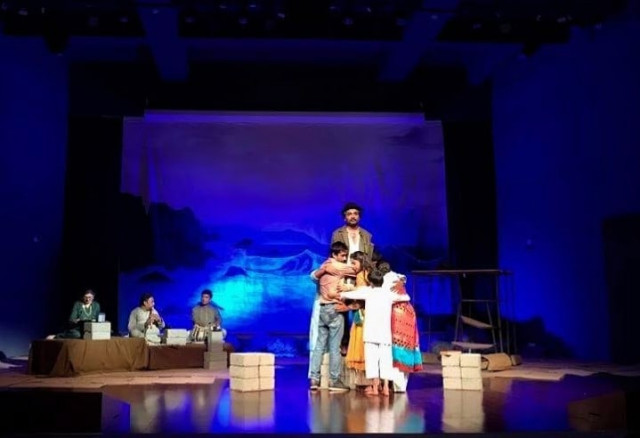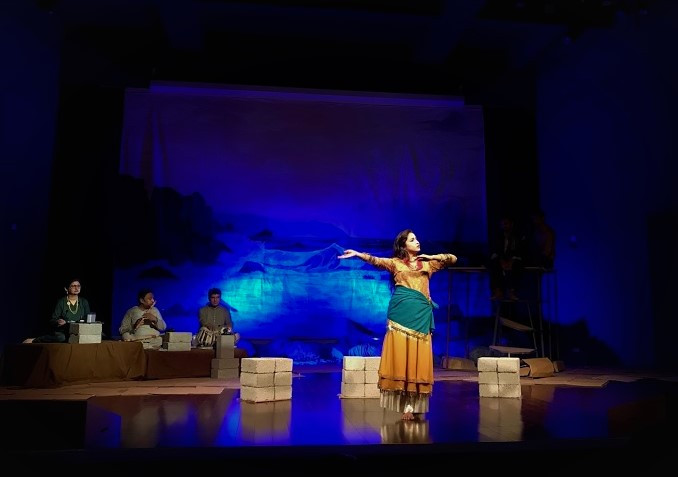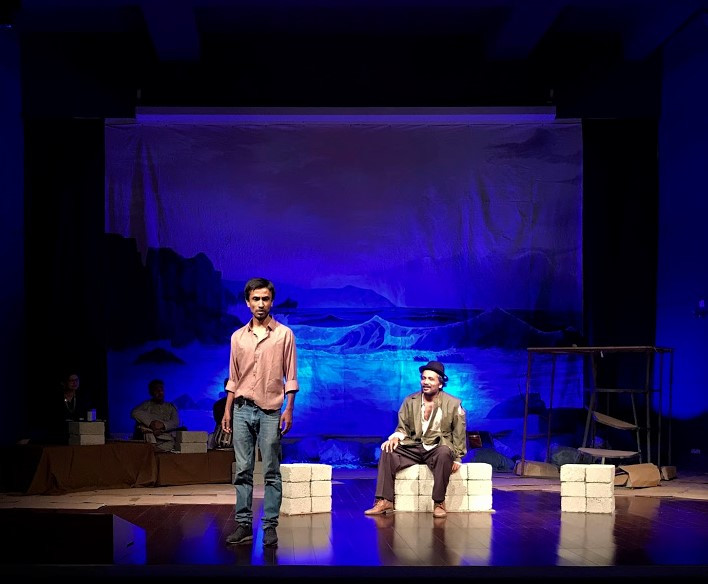Kal Agar Main Marjaoun: Worth the wait
Bee Gul’s ‘Kal Agar Main Marjaoun' offers a lyrical, gripping exploration of the human condition

Karachi: An ordinary set of bricks and cardboard sheets against an extraordinary backdrop of the azure sky, where the clouds crumple and the ocean waves spill onto the beach rocks. When the lights fade out, the spotlight falls on a glossy dark wooden study with a brass desk lamp. His orotund voice thick with emotion, Khalid Ahmed recites Sahir Ludhianvi’s Khudkushi Se Pehley [Before Suicide].

Photo: Tehreem M. Alam
Produced by Vasl Artists’ Association, Kal Agar Main Marjaun was an invite-only play staged in Karachi over the weekend. The theatrical production offered a chiefly lyrical, gripping experience exploring the human condition. Directed by Khalid Ahmed and written by acclaimed writer Bee Gul, Kal Agar Main Marjaoun is set near the sea, at a metaphorical distance from the evils plaguing society.
Following Khalid Ahmed’s poetic oration, the play moves on to the silvery vocals of Ayesha Nadir Ali; the lyrics of her song foreshadowing the inability to seek solace in the travails of humanity.
The Deceptive Present
Set at the vastness of the sea, the production aimed to plunge the audience into a surreal atmosphere that hits at the specious nature of time. It pervades histories, families and genders, but is still not absolute.
The play’s lead, Gautam – played by Napa’s Nazar-ul-Hasan – jibes at the idea of time throughout the play. Reflecting on his past, he is now of the view that no amount of time can change the terrible condition of the human predicament.
The well-crafted play also enacts this sense of perpetuity – the set remains the same, the main characters remain the same, the dramatic recitations have the same intensity, the dialogues have the same inability to find answers. Nothing is changed, nothing ‘new’ happens - except, perhaps, the dances that puncture the pockets of tension that arise from the absurdist dialogues between Nazr-ul-Hasan and Tariq Raja.

Photo: Tehreem M. Alam
In Blissful Ignorance
While Gautam preaches absurdism, Raja’s suicidal character digs into the thin patches of the human psyche. From looking at death as a break from reality, a form of escapism, he eventually transforms his nihilist approach to a surrealist one. After his third conversation with Gautam, he is seen as juxtaposing literal death with metaphorical one – where he dies every time he feels helpless. This is followed by Ayesha singing Mirza Ghalib’s Ye Na Thi Hamari Qismat Ki Visaal-e-Yar Hota:
‘kahun kis se main ki kya hai shab-e-gham buri bala hai /
mujhe kya bura tha marna agar ek baar hota’
An emotion so well-articulated that the multifaceted poet Faiz Ahmed Faiz also borrowed it and took it as is in his poem Dil-e-Mann Musafir-e-Mann.
Bee Gul’s signature writing style touches something profound in the human psyche and without stating much, the character reflects back on the times he felt like a living corpse – mainly by telling the audience how, during his childhood, he was silent when his uncle bought him a toy for being complicit; and after he got married, for letting the people at his workplace treat his wife as political fodder in exchange for his promotion.
A Sea of Hopelessness
While one felt trapped in an incomprehensible world trying to unpack the layers of nihilism behind the dialogue between the leads, Samuel Beckett’s ‘Waiting for Godot’ keeps playing in your head.
Often chaotic, the dialogues between the main characters really make one question whether life ends when you die or not. More often, the discourse also implies a loss of control; of accepting whether existence and nihility complement each other.
However, one must imagine Sisyphus happy.

Photo: Tehreem M. Alam
At a time when television shows are replete with stories that perpetuate the patriarchal narrative, Khalid Ahmed and Bee Gul bring something new to the table. With an explosive cast and an excellent script, the play aims to communicate man’s intimate intuition of the human condition and his vision of the world to make sense of the questions that are ultimately unanswerable.



















COMMENTS
Comments are moderated and generally will be posted if they are on-topic and not abusive.
For more information, please see our Comments FAQ